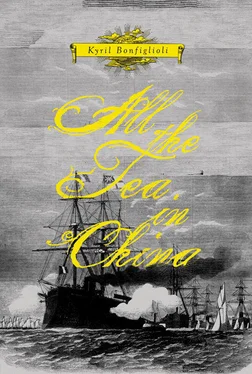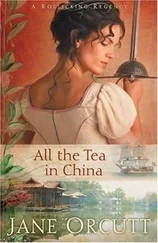
PART ONE. The Running Away

I was running, running, fit to burst my breast; the shot-gun pellets in my left buttock burning like a foretaste of hell. It is hard for a man to run after a vigorous passage of lechery with a young woman, harder still to do so when he is holding up his breeches. I stopped to draw breath, and to attend to the buttons of my small-clothes — and to listen. I could hear nothing behind me; in particular I could not hear the baying of my uncle’s great dogs, thank God. Why he should have been so upset at finding me in an embarrassing posture with my own cousin is a mystery to me: we were, after all, engaged to be married, he knew that.
After a while I started to run again, but more slowly now for I had a tryst with another young lady that evening and I felt that in all fairness to her, I should husband my strength. She, this other one, was there: in the shadow of the great magnolia tree in the northwest corner of the knot-garden beside her father’s castle. We embraced passionately.
“Karli,” she murmured as we drew apart after our first frantic embrace, “why does your heart thump so?”
“For love of you,” I lied valiantly. “It always thumps so when you are near, dearest one.”
“I am so happy that you feel so,” she said, still murmuring, “because I have such a wonderful piece of news for us.” My heart missed a thump. I cocked an ear for the baying of hounds but there was only the rustle of magnolia leaves and two hearts beating as one, although for different reasons.
“Tell me this fine news, my sweet and only love,” I said, furtively feeling the back of my breeches on the left side, “tell me it all, my Eve with the sweet little apples.”
“Karli, you have given me a baby, I am so happy I could cry!” Naturally, she started to cry. My heart now began to thump in earnest. I collected my wits.
“And have you told your father the Ridder, dearest love?” I asked diffidently.
“Of course not, Karli, he would kill you, you know that. No, we shall say nothing to him nor to Mama, we shall run away. We shall be very poor but you can work on the canal and I shall take in washing and we shall be so happy with our baby and our love in some tiny cottage far, far away from here.”
To speak plainly, this was far, far away from the future I had planned: my courtship of the Ridder’s horse-faced daughter had been an attempt to better my station in life: the thought of toiling on a canal-dredge all day and returning at night to a red-wristed washerwoman and a brat in a squalid cottage was not at all what I had had in mind for myself.
“I shall lie down now, dearest one of all,” she said, “and you shall have your will of me, you bad, shameless, wonderful boy.”
Love — physical love in those organs designated for it — vanished and shrivelled with an almost audible rustle.
“No, heart of my heart,” I whispered, “not tonight. Tonight is too sacred. I must be strong for both of us — I shall go home and pray for our happiness in store, in store for us three. You must go to your bed and take great care of yourself and of the little fruit of our love.” I was a wonderful liar in those days.
She meekly agreed. I have often observed that women, in some matters, are almost as stupid as men. After many a perfunctory kiss, I was running again. This time, home to my mother was where I was running.
I did not cry “Oy veh!” as I ran, because on my father’s side I am a Jew of the Sephardim, the aristocrats and scholars: our private language is Ladina , not the Yüddisch of the base Ashkenazim of the East. I have, of course, some smattering of Yüddisch but, frankly, I had no breath to cry “Oy veh!” or anything else. With my mother was where I needed to be, even if I had to take a bowl of her strong chicken broth.
You must understand that I was then a young — and am now an almost elderly — Dutch Jew, so of course I must be a liar. I understand that: it is of no importance. Words are words; truth is something precious you share only with your family. So do not burst a kishka trying to believe what I am writing: just enjoy. You will learn nothing of importance from this story except, perhaps, how to die; but then, you were born knowing that and in any case it only has to be done once. It is easy: ask anyone who has done it.
My nose was dragging on the ground by the time I reached my mother’s house: she must have been waiting, for the door opened before I could rattle the pin. She looked me up and down. I opened my mouth.
“First eat,” she said firmly.
“But Mama—”
“Eat!” she said and steered me to a chair. I yelped as I sat down to the table and, in the twinkling of an eye, my mother had hoisted me up and bent me over. She is — was, now, I think perhaps — a little woman and fat but strong. She put her hands to her cheeks and started to keen, but quietly, so as not to waken my father.
“Mama, please,” I said, “I am not badly hurt, I tell you truly.”
“Your great bottom I’m not crying about — but who made you those beautiful broadcloth breeches not two years ago, and who now has to wash the blood off and maybe darn twenty little holes?”
Still bent over the table, my face among the knives and forks and plates, I answered with dignity.
“Mama, I’m hungry. Yet.”
Without a word she flitted to the big iron kitchen-range and, by the time that I had adjusted myself to sitting on the right cheek of my bottom, there was a bowl of her best chicken broth steaming in front of me, scattered with those little crisp things; I forget the English word for them.
Five minutes later I wiped my mouth politely and she set before me a plate of delicate chopped liver, such as only she can — could — make.
When I had dealt honestly with that she asked me whether I was ready for my supper.
“I am sorry, Mama,” I said sheepishly, “but tonight I seem to have no appetite. And my bottom hurts.”
“Ah, yes,” she said, a trifle piqued, “the bottom I had almost forgotten. Get the breeches off, I shall look.”
“Mama, I am almost twenty — please !”
“That bottom I have washed a thousand times before you even knew it was a bottom. And men I’ve seen before — relatives I mean, naturally. Now quick, down with the breeches before they are spoiled.”
A few minutes later she said, “Such a baby, I never heard such squealing. And it’s not buckshot, the gamekeeper loaded his gun with rock-salt only.”
“Mama.”
“Yes, son?”
“This wasn’t a gamekeeper. It was your brother, my uncle; my Oom Kaspar.”
She didn’t say anything, she stood back and folded her arms. While I was explaining, delicately, how things had been when my uncle burst in upon us, she pursed her mouth in a way which was not wholly condemnatory. I could see that she was thinking of how things could be arranged with decency. Before she could give a verdict I said, “Mama?”
“Yes, son?”
“Mama, there is a little something else.” I told her about the Ridder’s daughter at the castle. She did not clap her hands to her cheeks, she did not moan; she gave me a long, blank look, so careful not to be frightened that it frightened me.
“Just like your father,” she said at last. “A stallion, a mad stallion.”
I gaped at her amazedly. My father, slight, silver-haired, gentle, a bookworm, was snoring gently upstairs over his treasured copy of Jakob Böhme’s Mysterium Magnum , that great and ridiculous work by another philosophical cobbler. (The sign over our door read Jooss v. Cleef, Saddler and Maker of Riding-Boots to the Nobility and Gentry” but my father was, in effect, a cobbler.) To speak of my father as a mad stallion was purely absurd: he was, as I have said, snoring gently upstairs over his book of recondite philosophy.
Читать дальше














